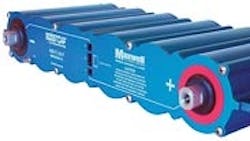Diesel Engines Jumpstart Ultracapacitor Applications
Alcoa AFL Automotive and Maxwell Technologies will collaborate on the development of a cold start system for commercial transportation vehicles. The companies will incorporate Maxwell's BOOSTCAP ultracapacitors with AFL's power management system to develop an efficient engine starting system.
Increasingly strict environmental regulations preclude the ability of operators to allow their trucks to idle overnight. More than 20 states have enacted or are proposing regulations that prohibit running diesel truck engines overnight to power heating, cooling, entertainment and other driver-comfort features.
However, running those loads on battery power can leave the batteries with insufficient power to start the vehicle, especially in cold weather. "With the AFL-Maxwell cold starting system, the ultracapacitor pack would provide what amounts to an on-board jump-start capability," explained Allen Zwierzchowski, President, Worldwide Components AFL Automotive.
The BOOSTCAP ultracapacitor series supports a short-circuit current within the range of 3.5 kA to 4.8 kA, which greatly exceeds the current consumption of a diesel starter motor. Furthermore, according to Michael Sund, VP of Marketing for Maxwell, the ultracapacitors would be maintenance free for the life of the vehicle.
At present, the design for the cold starting system is expected to require three 16-V BOOSTCAP modules. The BOOSTCAP modules can operate within a temperature range between -40°C to 65°C. When operating within this specific range, the capacitors can support over one million charge and discharge cycles. To maintain this reliability, the system’s ultracapacitors will not be placed within the engine compartment.
Once the cold starting system has matured for commercial vehicles, the technology could be extended to consumer vehicles, such as RVs. Sund stated research is also being done within the consumer auto industry to develop this capability.
Sund continued that another potential benefit of this system is a reduction in battery size without a reduction in cranking current capacity, nor would weight, size or cost penalties be incurred in the overall system. This might lead to advantages in other types of vehicles, especially general aviation aircraft. However, neither Maxwell nor AFL has suggested this is a potential application.
Yet another potential application deals with boosting the cranking voltage of a 12-V battery to 28 V through the use of a BOOSTCAP module in series with the battery during cranking. According to John Miller, V.P. of Advanced Transportation Applications at Maxwell, a BMOD2600 module (430 F, 16 V) in series with a standard 12-V lead-acid battery could provide that capability. While the voltage of the ultracapacitor stage will decay faster than a second lead acid battery would, the decay is manageable for this application.
Sund cited industry data showing that last year, approximately 253,000 class 8 trucks and nearly 90,000 class 7 trucks were purchased in the U.S. alone. With such a huge potential market and possibly larger aftermarket, the adoption of the cold engine starting system could potentially revolutionize the motor vehicle industry. For truck drivers and other traveling motorists who would no longer hear the continuous idling of diesel engines, this revolution would be literally silent.